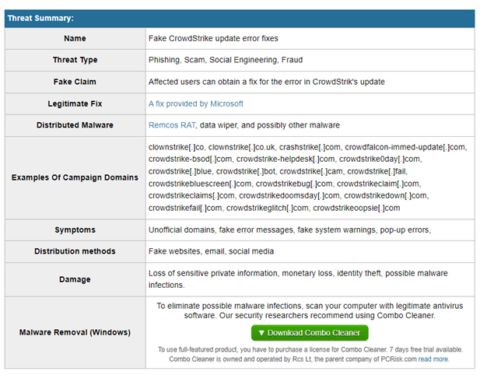The Importance of Cyber Security Awareness Training: Protecting Your Business from Digital Threats
From ransomware attacks that cripple operations to data breaches that expose sensitive customer information, the consequences of a successful cyberattack on your business can be devastating. While technological defences are essential, too many businesses don’t prioritise and dedicate sufficient resources to one critical aspect of cyber security: employee training.
The human element in cyber security
Research has shown that employees can be the weakest link in an organisation’s cyber security chain. Cybercriminals exploit human vulnerabilities through sophisticated tactics like phishing emails, social engineering, and malicious downloads.
For example, within hours of the Crowdstrike outage becoming public earlier this year, scammers were already developing targeted cyber security attacks to take advantage of the uncertainty.
Even the most robust technical defences can be rendered useless if an employee inadvertently clicks on a malicious link or shares confidential information.
Cyber security awareness training increases awareness and empowers employees to become the first line of defence against cybercrime in your organisation. Educating your team about the latest cyber threats and providing them with the tools to identify and respond accordingly, can help significantly reduce the risk of a potential cyberattack.

Types of cyber threats
Cyber threats are constantly evolving, making it imperative for businesses to stay informed about the latest tactics used by cybercriminals. Common threats include:
- Phishing: Phishing attacks involve deceptive emails or messages that trick recipients into revealing sensitive information or downloading malware.
- Ransomware: Ransomware encrypts a victim’s files, demanding payment in exchange for the decryption key.
- Social engineering: Social engineering involves manipulating individuals into divulging confidential information or performing actions that compromise security.
- Malware: Malware is malicious software that can disrupt operations, steal data, or provide unauthorised access to systems.
Cyber security awareness training equips employees with the knowledge and skills to recognise these threats and take appropriate action. By teaching them to identify suspicious emails, avoid clicking on unknown links, and report any security concerns, businesses can prevent many attacks before they cause significant damage.
CyBiz works with Cywareness, whose cyber security awareness training solutions enable organisations to maximise their employees’ cyber security potential by exposing them to the most relevant cybercrime scenarios on an ongoing basis, with no additional requirements or resources from their IT team.

The cost of cyber attacks
The financial and reputational costs of a cyber attack can be staggering. Businesses may face expenses related to data recovery, system repairs, legal fees, and customer notification. In addition, a successful attack can damage a company’s reputation, leading to a loss of customer trust and future business opportunities.
Cyber security awareness training is a cost-effective way to mitigate these risks. By investing in employee education, businesses can significantly reduce the likelihood of a successful attack and minimise the associated costs.
Benefits of cyber security training
The benefits of cyber security training extend far beyond simply preventing attacks. By prioritising employee education, businesses can:
- Increase awareness: Training raises employee awareness of cyber threats and helps them understand their role in protecting company data.
- Improve incident response: When employees are trained to identify and report potential attacks, businesses can respond more quickly and effectively to security incidents.
- Strengthen security culture: By promoting a culture of security awareness, businesses can create an environment where employees are vigilant and proactive in protecting company assets.
- Enhance compliance: Cyber security training can help businesses meet regulatory requirements and avoid costly penalties.
Best practices for cyber security training
To maximise the effectiveness of cyber security training, businesses should implement best practices such as:
- Regular awareness sessions: Conduct training sessions on a regular basis to keep employees informed about the latest threats and best practices.
- Simulated phishing attacks: Use simulated phishing attacks to test employee awareness and identify areas for improvement.
- Engaging training content: Make training content interesting and relevant to capture employee attention and improve retention.
- Tailored training: Customise training programs to address specific roles and responsibilities within the organisation.
- Leadership support: Ensure that leadership actively supports and participates in cyber security training initiatives.
Conclusion
Cyber security training is an investment in the future success and resilience of your business. It is not just a one-time event but an ongoing process that requires continuous commitment. By prioritising employee education and awareness, businesses can transform their workforce from a potential vulnerability into a powerful asset in the fight against cybercrime to protect sensitive data, safeguard operations, and maintain the trust of their customers.
Contact CyBiz to see how we can help protect your organisation’s cyber security awareness training.
Posted in Blog, Cyber Security Training, General
